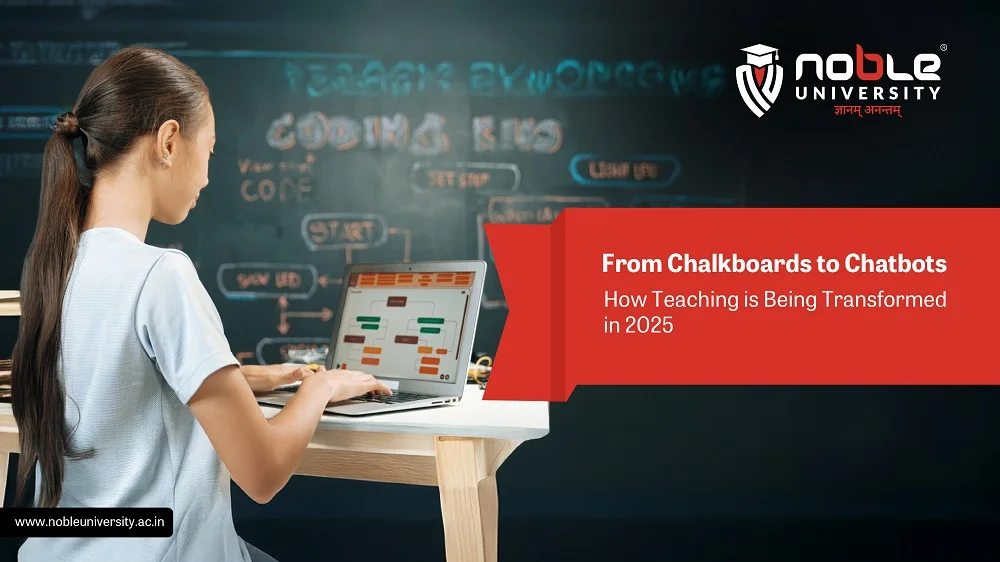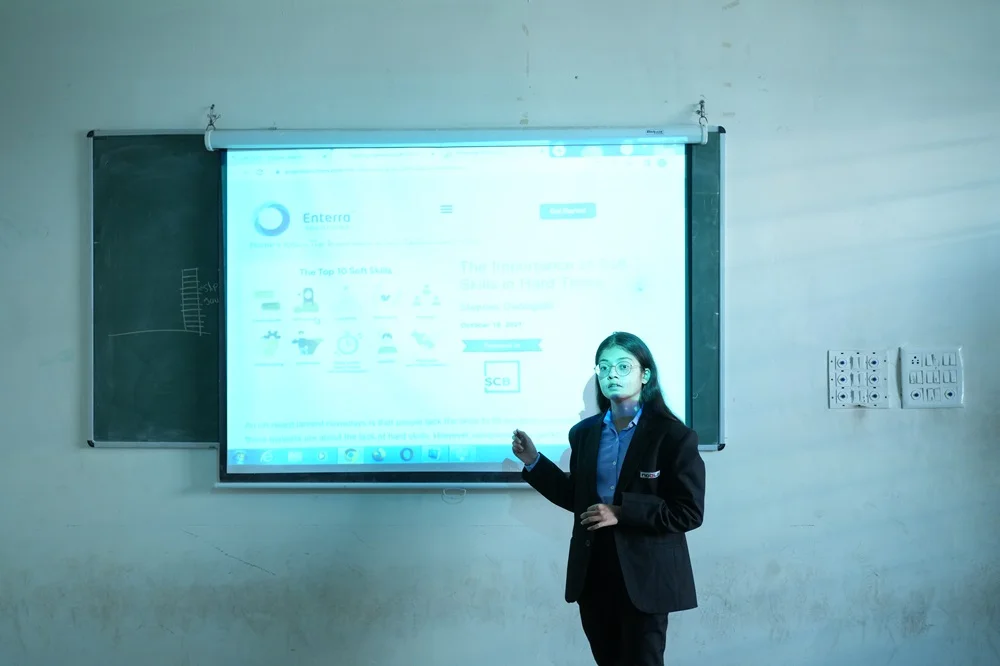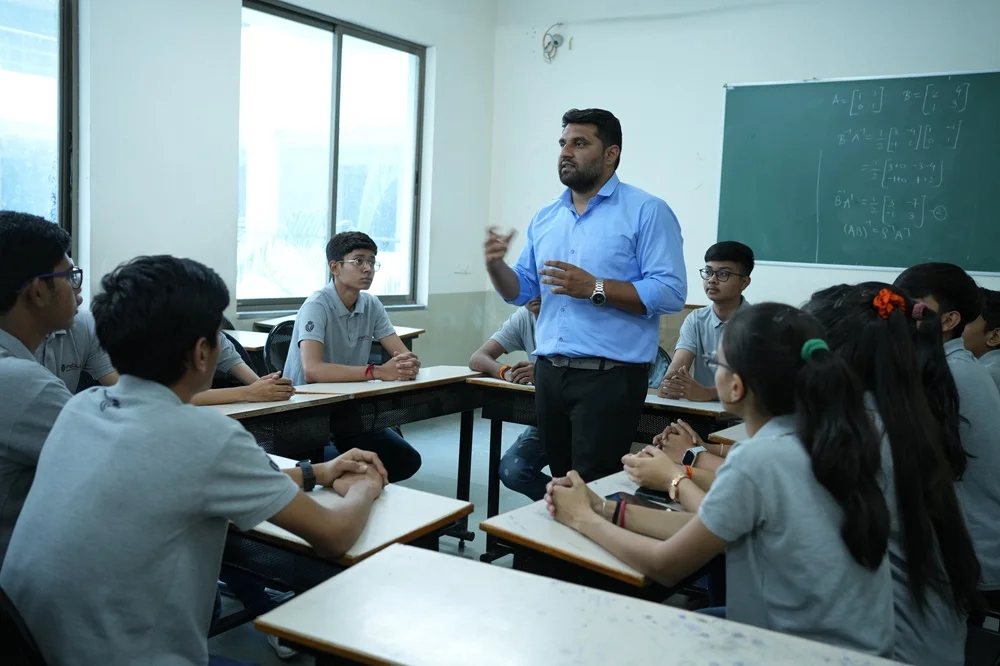
Redefining the Roles of Educators in the AI Era
The classrooms today are undergoing one of the most significant shifts in modern history, not due to new syllabi or infrastructure, but because of artificial intelligence (AI). Across India, more than 70% of teachers are already experimenting with AI tools, using them for lesson planning, assessments, and even interactive learning activities.
This marks a turning point: education is no longer only about transferring knowledge; it’s about guiding students through an environment where AI is a constant presence. For educators, this doesn’t mean replacement; it means redefinition. The role of teachers in the AI era is shifting from information providers to mentors, facilitators, and ethical guides who help students think critically, creatively, and responsibly in a world shaped by technology.
How is AI Empowering Educators
AI-powered personalised learning tools allow educators to tailor lessons to individual student needs. While AI generates custom learning paths and diagnostic feedback, teachers interpret this data to design engaging and relevant learning experiences. It’s this blend of AI delivering insights, educators providing human understanding that truly transforms education.
The impact of such personalised methods extends across India. Ahmedabad students, for example, report that AI tools significantly enhance academic performance, access to resources, and problem-solving skills. Still, while AI enables customisation, educators remain the vital link between data and human connection.

It’s Time to Balance Tech with the Human Touch
Educators must strike a delicate balance: embracing “AI as an assistant, not a replacement,” while keeping the “human touch in education” alive. Automation helps with paperwork, but empathy, intuition, and encouragement still require a teacher’s presence. A classroom defended by ethics, emotional intelligence, and mentorship cannot be replicated by any machine.
Here are some ways in which teachers can work in coalition with the AI technology:
1. Educators Adapting to Artificial Intelligence
Despite the rise of AI, not all educators are completely on board. A 2023 survey found that around 44% of teachers in India are concerned about AI’s influence on teaching and assessment. Concerns stem from unfamiliarity, lack of training, and ethical considerations. India’s own education system, evolving through hybrid learning models and increasing AI tools adoption, now needs robust strategies to train and support educators effectively.
2. Guiding the Ethical Use of AI
As AI becomes part of classrooms, ethical questions emerge. Who owns the data? How do we ensure fairness? Educators must lead by example, showing responsible and transparent AI use. By modelling digital citizenship, respecting privacy, and upholding academic integrity, they teach students that technology is powerful only when used ethically.
3. Embracing Digital Tools for Engagement
Today’s classrooms go far beyond chalkboards and lectures. Virtual labs, interactive dashboards, and AI-driven apps are transforming how lessons are delivered. Teachers who adopt these tools unlock new ways to engage students and make learning dynamic. In this changing landscape, digital fluency isn’t optional—it’s essential.



4. Moving From Instruction to Mentorship
With AI handling repetitive tasks such as attendance, grading, and scheduling, teachers are able to step into more meaningful roles. The role of teachers in the AI era now leans heavily toward mentorship, guiding students, sparking curiosity, and fostering critical thinking. No longer mere content transmitters, educators become mentors who nurture creativity, empathy, and ethical reasoning, traits that AI can’t replicate.
5. Redefining Teaching in the AI Era
The future of teaching lies in blending technology with humanity. While AI may suggest strategies, personalise content, or flag struggling learners, the teacher’s role is to interpret insights, nurture passions, and guide ethical growth. Far from replacing educators, AI enhances their impact.
6. Moving Beyond The “Teachers vs AI” Debate
The debate of “teachers vs AI” misses the point. Educators aren’t being replaced; they are being redefined as collaborators with data, emotional anchors for students, and ethical guides in the digital world. This evolution calls for adaptability, lifelong learning, and a mindset that views AI as an enhancer – not a competitor.

Why Noble University Leads in the AI–Educator Journey
At Noble University, we understand that redefining education in the age of AI means empowering educators with empathy, insight, and vision. The Visionary Management of Noble University reflects a bold commitment to transforming education through innovation and inclusivity.
Led by seasoned educators and embedded in a multidisciplinary environment, this philosophy drives everything we do – from curriculum design to student support. We focus on helping educators and students learn how AI tools are transforming how students study today.
Noble University: Shaping Futures in the Age of AI
At Noble University, we believe the future of education isn’t just about adopting technology, it’s about preparing people who can guide its use responsibly. Our programs are designed to empower students and educators alike with the knowledge, skills, and ethical grounding needed to thrive in a tech-driven world. Whether you dream of becoming an entrepreneur, researcher, industry leader, or policymaker, Noble University gives you the platform to turn ambition into achievement.
Begin your journey today by exploring our programs at Noble University or connect with us through our
FAQS
In the AI era, teachers serve as mentors who nurture critical thinking, creativity, and ethical judgment in students. While AI can assist with data-driven tasks, the teacher remains central to shaping a student’s overall development.
AI will free educators from routine tasks like grading or scheduling, allowing them to focus on personalised teaching. This shift redefines their role from information providers to facilitators of holistic learning.
AI enables personalised learning experiences, improves access to resources, and supports real-time progress tracking. It also helps educators save time and concentrate more on student engagement.
AI acts as an assistant that provides adaptive learning materials, intelligent assessments, and data-based insights. Its role is to enhance, not replace, traditional teaching methods.
Human teachers provide empathy, moral guidance, and contextual understanding that machines cannot replicate. They ensure education remains meaningful and values-driven in a digital age.
Teachers may face difficulties such as limited training, ethical concerns around student data, and the fear of being overshadowed by technology. Adapting to these changes requires continuous learning and support.
AI can manage repetitive and analytical tasks, giving educators more time for mentoring and interactive teaching. Together, they create a balanced approach that blends efficiency with the human touch.


